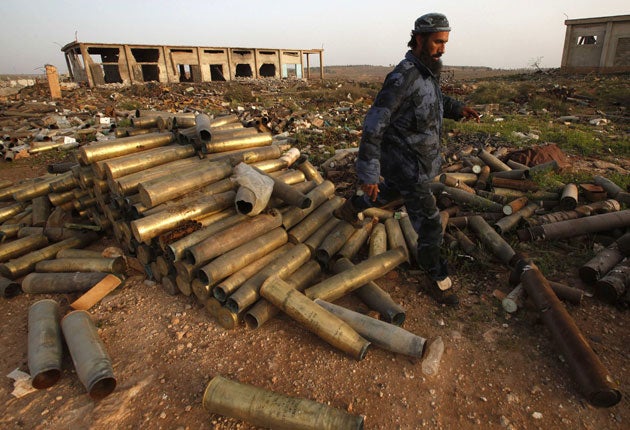Britain offers covert help to Libyan rebels as fighting kills further 100

Libya's bloody civil war continued yesterday without a breakthrough for either side, despite intense fighting which has seen possibly more than 100 killed in the past 24 hours. But, as a no-fly zone was considered in public, in the shadowy spheres of deniability, covert assistance for the anti-Gaddafi rebels was being prepared in London, and probably Washington, too.
Government sources said yesterday that a "diplomatic task force" would be sent to Libya to make contact with opposition leaders. But, while the politicians talk only about humanitarian assistance, behind the scenes, experts are preparing to go in and talk to the rebels about giving them a lot more than food parcels and tents.
The success of such a mission depends on it remaining secret, and last night there was a disturbing report which, if true, would mean any covert British effort would be undermined. The Sunday Times reported that an SAS unit accompanying a British diplomat on his way to contact anti-Gaddafi officials had been detained by the rebels. They were, reportedly, angry, because they feared evidence of western intervention could be exploited by Gaddafi. The report could be not confirmed.
A former military intelligence officer said last night: "There is the absolutely covert element of the 'secret war' variety, where they will be helping the opposition by offering military assistance, letting them know where the government forces are."
Such assistance, which is likely to be mirrored by a similar US effort, is much needed in what threatens to be a very protracted conflict. While rebel forces continued their advance from the east yesterday, capturing two towns on the route to the capital, Tripoli, there was brutal close-quarter fighting in Zawiyah, 30 miles from Gaddafi's headquarters.
This is a totemic place for the two sides, and the fortunes of both oscillated markedly yesterday. After Friday's day-long offensive, Gaddafi's men had taken most of the city, forcing the rebels to retreat into the ominously named Martyrs Square. A last stand, and possible massacre, was in the offing. At first light, Gaddafi's forces entered the city, firing on residential buildings. The rebel spokesman, Youssef Shagan, said: "There are tanks all around the square. They've closed all the roads. They're using tanks and heavy weapons to cover their soldiers." Thick black smoke hung over parts of the city, and snipers were firing on anyone on the street.
An hour and a half later, Mr Shagan was claiming rebels had repulsed the Gaddafi attack, and captured two tanks. A witness told Al Arabiya television that rebels were celebrating victory in the main square. Then came news that government forces had begun preparing a second offensive. This duly came, with a vengeance and 20 tanks. Abu Akeel, a resident, said: "The fighting has intensified and the tanks are shelling everything on their way. They have shelled houses. Now they are shelling a mosque where hundreds of people are hiding. We can't rescue anyone because the shelling is so heavy." Residents said Gaddafi forces stormed residential buildings and killed people inside to secure the rooftops for snipers.
Even before this second attack, the death toll in the city was reported by doctors to be at least 60 in the past 24 hours. Another place where considerable loss of life was reported was Benghazi, where a large arms and ammunition depot blew up on Friday. The initial death toll was at least 26, and likely to be twice that.
But there was, for the rebels, much better news from the east. Within a day of seizing the oil port of Ras Lanuf, the revolutionary fighters had also taken over of Bin Jawwad, a major garrison for the Libyan military, without firing a shot.
The Independent on Sunday arrived at Bin Jawwad yesterday to find no side in control and a group of men waiting at the gate. They had seen Gaddafi's troops stream past them as they abandoned their previous position, Ras Lanuf. Soon afterwards, soldiers guarding a checkpoint also melted away.
Gaining the two cities, after repulsing an attack by the regime's forces on Brega, has given the rebels a significant strategic advantage on the main coastal route to Tripoli. If their advance continues at this pace they will soon be in a position to come to the aid of Misurata, an opposition town which has been under siege from loyalists for more than week. Rebel commanders say they may also be able to take a southern route to try to relieve Zawiyah. However, they would first have to go past Sirte, Gaddafi's birthplace.
In Ras Lanuf, residents claimed that regime officials had offered dozens of men 60,000 dinars (£30,400) each to join a militia. This was followed by distribution of guns to those who had signed up. Mohammed Anaas, a receptionist at the El-Adil Hotel, said: "Unfortunately the liberation of this place took place on Friday when the money was supposed to have been handed over. But the rifles were useful; all those who had said they would join this militia used the rifles to shoot the Gaddafi men." It is that kind of war.
Join our commenting forum
Join thought-provoking conversations, follow other Independent readers and see their replies
0Comments